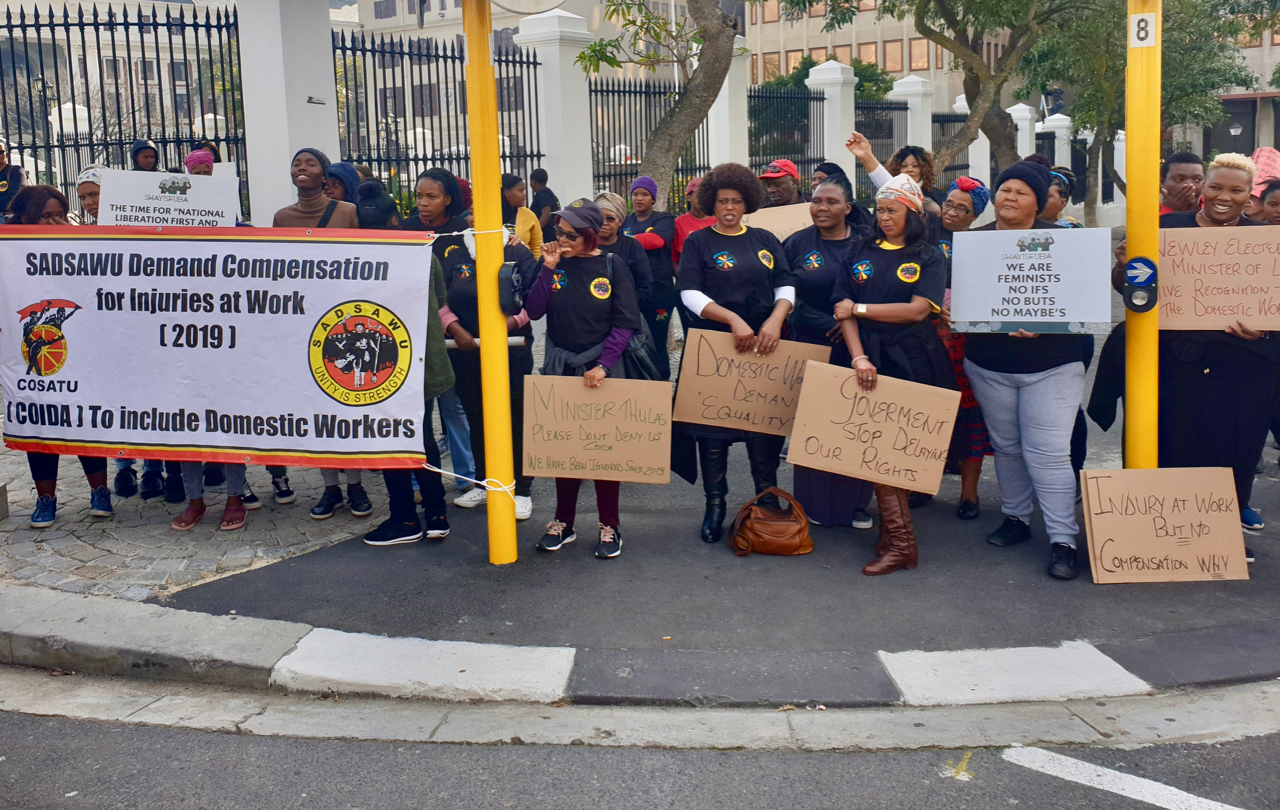

Domestic workers protested outside Parliament in June last year, demanding access to the Compensation Fund. Archive photo: Mary-Anne Gontsana
9 March 2020
On Tuesday, the Constitutional Court will hear argument in a case which has significant implications for the rights of domestic workers. Domestic workers are challenging legislation which excludes them from claiming from the Compensation Fund for death, injury or disease during their employment. The Pretoria High Court ruled in their favour and the Constitutional Court must now decide whether to uphold that ruling or reject it.
The purpose of the Compensation Fund is to provide compensation to employees who die, are injured or contract disease during the course of their employment, and their dependents. The employee does not have to prove that the employer was at fault in order to be entitled to compensation. This means that the Fund provides a speedy and cost-effective alternative to litigation. Instead of suing their employer, employees can simply lodge a claim with the Compensation Fund. The Fund includes compensation for permanent or temporary disablement; medical costs and death benefits. However, the legislation establishing the Compensation Fund expressly excludes domestic workers from the definition of “employee.”
The Plaintiff in the case is Bongi Mahlangu, the daughter of Maria Mahlangu, a domestic worker who is since deceased. Maria Mahlangu worked for her employer, the De Clerq family for 22 years. On 31 March 2012, she drowned at the De Clerq’s family home while on duty.
Maria Mahlangu’s daughter, Bongi, and her son were financially dependent on her and sought compensation. The De Clerq family offered them R5,000, according to the court papers. Bongi Mahlangu approached the Department of Labour to enquire whether there was any possibility of compensation. However, she was informed that because her mother was a domestic worker she is not entitled to any claim in terms of the applicable legislation.
She was then approached by a member of the South African Domestic Service and Allied Workers Union (SADSAWU) who encouraged her to take the matter to court. She asked the Pretoria High Court to declare the legislation unconstitutional because it excludes domestic workers from the definition of employee.
Mahlangu argued that the legislation was unconstitutional because it was irrational. Also, that it violated the rights to equality, dignity and access to social security.
The High Court ruled in her favour and declared the legislation unconstitutional. The order was to have immediate effect and be retrospective.
In terms of the Constitution any order declaring legislation unconstitutional, must be confirmed by the Constitutional Court to have a final effect. It is for this reason that the decision has now been referred to the Constitutional Court.
Bongi Mahlangu and SADSAWU want the Constitutional Court to uphold the High Court decision. They argue that the legislation is unconstitutional because:
Mahlangu and SADSAWU want the order to be made retrospective.
The Women’s Legal Centre has made submissions as a friend of the Court, asking the Court to take an approach which addresses the multiple forms of discrimination which domestic workers face based on their race, gender and socio-economic status. Historically, domestic work has been stigmatised and consequently undervalued, unrecognised and unpaid, they say. In addition to the Constitution, they also rely on international sources such as the UN Sustainable Development Goals and the ILO Convention on Domestic Work to support their submissions.
The Respondents – the Minister of Labour, the Director-General of the Department of Labour and the Compensation Commissioner – concede that the legislation is unconstitutional for the reasons advanced by Mahlangu and SADSAWU. They do not oppose the order sought.
The Constitutional Court will hear oral arguments on Tuesday, 10 March 2020.